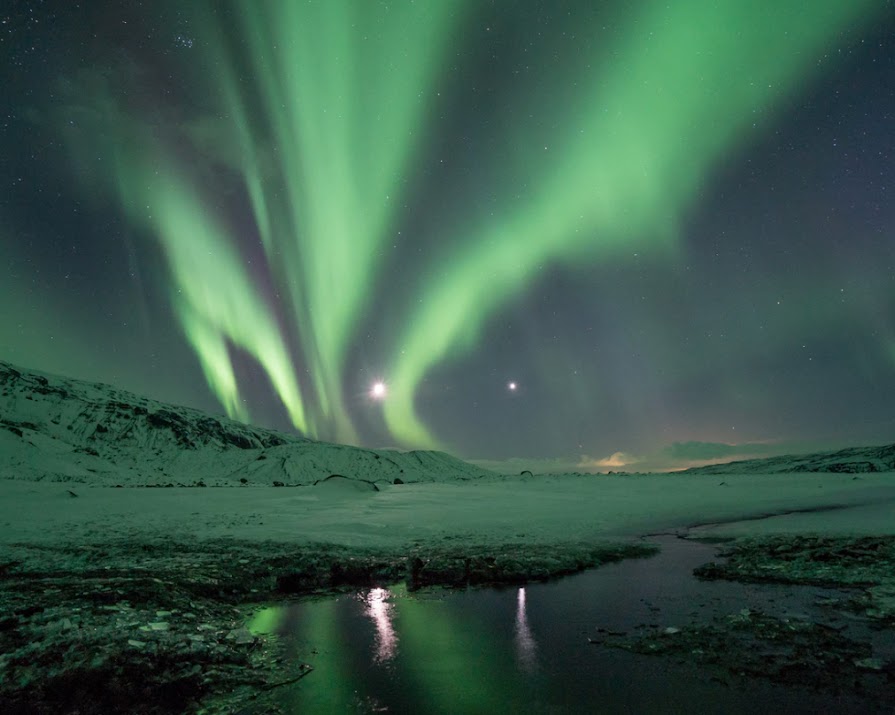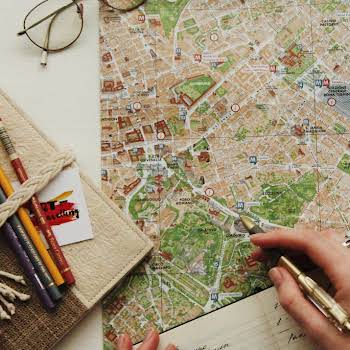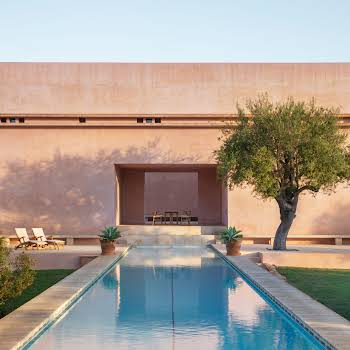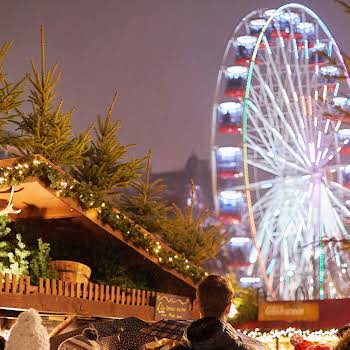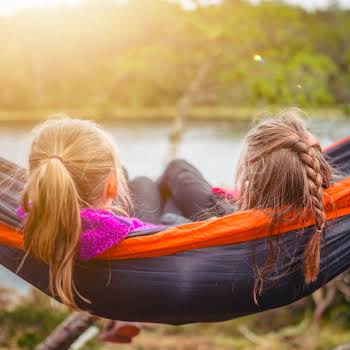
By Amanda Cassidy
19th Sep 2018
19th Sep 2018
Prices in Iceland can be expensive but with some clever planning, Amanda Cassidy believes you can experience all that the land of ice and fire has to offer without breaking the bank
My first view of Iceland is of ice and I’m largely surprised. I’m not sure what I’d expected to see, but the miles and miles of white I spy from the window of the plane was dramatic, pretty and terribly exciting. After years of procrastinating about my precious bucket-list, I was finally doing something about it. Seeing the Northern Lights was always top of that travel wish-list – a romantic notion of celestial glows, snowy nights and that unnervingly wonderful feeling of being dwarfed by nature. So we packed the kids off to their grandparent’s house (no mean feat) and here we were in this magnificent land of ice and fire.
The Blue Lagoon
Iceland has a reputation as an expensive travel destination and judging by the €20 club sandwiches for sale on board our flight, we braced ourselves from the get-go. But our mission was to visit Iceland on a realistic budget. We wanted to see it all without paying through the nose. We stayed for three nights which is completely do-able – especially if you have little ones you don’t want to leave for too long.
The whoosh of cold air hit us as we walked out of the terminal building at Keflavík. That giddy feeling of wanting to play in the snow took over and it was impossible not to throw snowballs as we collected our rental car. All rental cars in Iceland have to have winter tyres which was a relief as we set off towards Reykjavik. The cost of the rental car was €120 for three days – but do beware of the cost of fuel. A taxi costs €60 each way and as we were using the car to explore much of the country, it made sense. It takes about 45 minutes to drive from the airport into the city of Reykjavik but as the Blue Lagoon is along the way, we figured it was a good idea to visit it while travelling from the airport into Reykjavik.

It was afternoon by the time we drove up towards this landmark lagoon. It is the most visited attraction in the country. As we saw the steam rising against the snowy back-drop, we drove a bit faster. The Blue Lagoon is a geothermal spa located in a lava field in an area called Grindavik. Its warm waters are rich in minerals like silica and sulfur which is good news for anyone suffering from skin conditions like psoriasis. In fact, the Blue Lagoon also operates a research and development facility to help find cures for other skin ailments using this mineral-rich water. You will also find special conditioner available that you are encouraged to lather all over your hair to prevent it drying out. This is unavoidable and essential unless you enjoy the frizzy, cracked look I ended up sporting for the rest of the trip because…..stubborn.
Some people are disappointed to learn that this lagoon is a man-made attraction and they often bemoan the price (around €54 euro per person) but believe me, it is quite the experience. Walking outside into the steamy cold-warm felt other-worldly. The milky-teal pool is inviting, and the whole vibe is really special. Stepping into the 39-degree water while it is snowing all around you is squeal-inducing and highly recommended. The silica face masks are free and you can swim up to the bar to order a drink using the wristband you are given when you check in.
I loved the romance of it all, but the experience is somewhat punctuated by people Facetiming their loved ones loudly while in the water; annoying when you are trying to channel your inner mermaid.

Reykjavik
After a wonderful two hours gliding and floating, we packed ourselves back into the car and headed towards Reykjavik. Driving in another country can be daunting but the roads here are good and the infrastructure well throughout. If the weather is bad, they get closed off immediately and drivers are directed to another, safer route. I would recommend getting Sat-Nav as it takes the pressure off when you are driving on unknown roads in snowy conditions. We chose to stay at an Airbnb home which was five minutes walk to the shops and restaurants on the main street of Reykjavik and had free parking outside. So far, so not too expensive – and then we went for dinner.
Kol is a beautiful restaurant on Skólavörðustígur, just a couple of houses down from Hallgrímskirkja (the big church). I’d read some really good reviews about it and it is fair to say we had a fabulous dinner, but the price was pretty extravagant (there was a steak on the menu for €94). We had a few different milestones to celebrate so we justified splashing out a little (no steak!) but if you are truly watching the wallet, this was completely unnecessary. There are plenty of nice, less expensive places to dine like the Hlemmur food hall where we actually had the best meal of the trip.

The Northern Lights
The Aurora forecast is a website where you can check the likelihood of seeing the Northern Lights. I’d been studying it tirelessly in the days before we travelled. It shows you where the lights might be more visible if the solar activity is strong. It is marked out of a scale from 0-9, with zero being extremely unlikely that there will be any visibility and 9 a very strong possibility that you could see the lights. It was hovering around 2 or 3 in the days that we were in Iceland so I was really trying to manage my expectations. I knew that the best chance, according to the weather charts, was on the first of our three nights. We grilled our waiter about the best place go to search for them and he, like all the Icelanders that we encountered on our trip, was more than obliging. He sat down with us for ten minutes and showed us some routes to take.
Buoyed up and fueled with boundless enthusiasm and ridiculously priced hake, we changed into our warmest thermals and set out towards the largest ski resort in Iceland – Bláfjöll.
It is open for night skiing so it is very popular with the local residents. Our friendly waiter had explained that it closes at ten, so the lights are low and the sky clear – but he didn’t really explain about the steep incline or the hairpin bends. The best time to see the lights is between 11pm and 2am so it was about midnight by the time we found ourselves chugging towards this mountain, scanning the sky above.
Silent awe
We’d been told not to expect to see the lights in case we were disappointed – we heard that is is better to view them as a bonus rather than the raison d’être to travel all the way to Iceland. Obviously, I ignored this advice completely and was placing all my hopes on finally seeing the Aurora Borealis with my own eyes. The bright dancing lights of the aurora are collisions between electrically charged particles from the sun that enter the earth’s atmosphere. But nothing can really explain how mesmerising they really are. Just as we were about to turn back from our wild goose chase, I spotted something in the sky that looked a little misplaced. We jumped out of the car and there they were – pale green arcs stretching across the sky, rippling and glowing like nothing I’ve ever seen before. The shock of the cold and the beauty of what I was seeing was jolting. I’ve often moaned that my eyes don’t see enough of the beauty of nature. I travelled a lot in my 20’s and almost took for granted the awesome displays of nature I’ve been lucky enough to experience – Whitehaven beach in Australia, the wilderness of Patagonia, the wild jungle surrounding Angkor Wat in Cambodia.
Now my eyes were being treated to a stunning light display that seemed like it was just for the two of us. We pulled into a safer spot and sat on the car bonnet in silent awe. It was definitely worth the chase. Nature was just showing off now.
The waterfalls
The next day, we accessed the Ring road which circles Iceland and drove towards the South Coast towards the showstopping Skógafoss waterfall. As the water falls, it kicks up tiered walls of spray. On sunny days, the mist creates the most beautiful shimmering rainbows. In winter, the falls actually glitter with ice. The remote location of these falls makes you appreciate the ineffable forces of nature that have shaped the landscape for millennia.

Iceland is a marvellous lesson in classroom geology. Situated on the Mid-Atlantic Ridge, a giant 18,000 km long rift between two of the earth’s major tectonic plates, the whole country is constantly shifting and flowing. Other attractions worth travelling to include the dramatic black beach at Vik that Game of Thrones fans will recognise, and the Vatnajöull Ice cap where you can spend a few hours hiking up to some of the most spectacular views in the country. The Golden Circle is another stunning area to explore. This route is very accessible by car, especially in the summer months. It is lovely to have a guided tour to get some more details about the history and geography of the amazing sites you are seeing, but for us, we enjoyed exploring the places ourselves and uncovering the interesting facts the old-fashioned way – through our guidebooks and maps. Starting at around €250 per tour (and there are plenty of them) it can push up the price of a trip like this a lot.

The ultimate bucket-list trip
Iceland, for me, delivered on everything I’d heard about it. We discovered it at our own pace, on a budget and had countless “am I really seeing this?” chills. This trip gave me the drama I needed whilst also reminding me of my adventure-loving side that I hadn’t seen in quite a while. Most of all, it reset my perspective when it comes to the beauty and power of nature.
For more information on tours and attractions contact the Icelandic Tourist Board.











